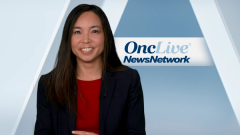
The Role of Molecular Testing in the Diagnosis of AML
Expert perspectives on the role of biomarker testing in the diagnosis and management of acute myeloid leukemia.
Episodes in this series

This is a synopsis of an Insights series featuring Catherine E. Lai, MD, MPH, of the University of Pennsylvania.
Dr. Catherine E. Lai discussed the importance of comprehensive biomarker testing at AML diagnosis. She recommended a bone marrow biopsy with morphology, flow cytometry, cytogenetics, next generation sequencing, and PCR testing. The only exception is if a patient has >20% circulating blasts, allowing tests on peripheral blood. She emphasized the importance of a baseline bone marrow biopsy since imaging cannot detect AML subtypes like in solid tumors.
Regarding comprehensive testing challenges, Dr. Lai noted that while all patients with AML should undergo testing, some decline bone marrow biopsies. She discussed the importance of educating patients on the role of testing to guide treatment selection. Turnaround time for results also varies, impacting time to make treatment decisions.
When test results return, common mutations include FLT3 (25% to 30% of patients), NPM1, IDH1/2, though at lower frequencies. Results inform prognosis and treatment options. For patients with mutation-agnostic disease, treatment is standardized. But for those with targetable mutations, molecularly targeted agents can be added to standard chemotherapy like 7+3 (cytarabine and daunorubicin).
Dr. Lai concluded by emphasizing that while turnaround times are improving, testing provides critical information to guide treatment selection and evaluate minimal residual disease to understand response. Comprehensive biomarker testing at diagnosis and during treatment is key for optimal AML management.
*Video synopsis is AI-generated and reviewed by OncLive editorial staff.





































